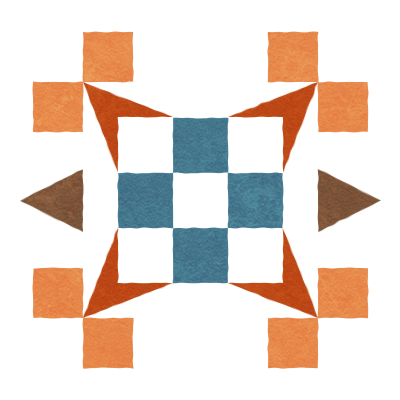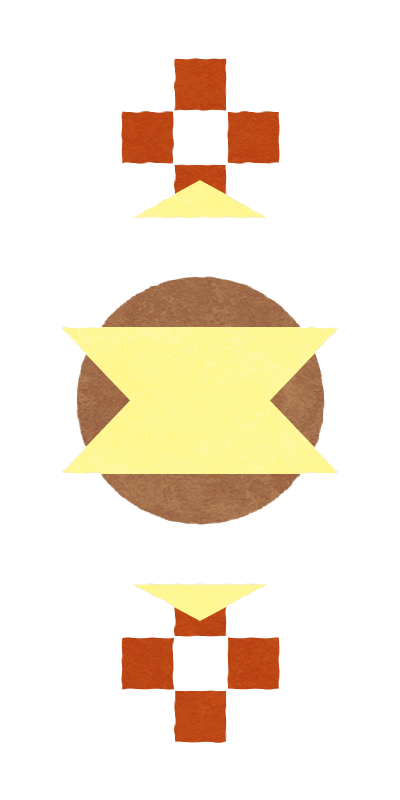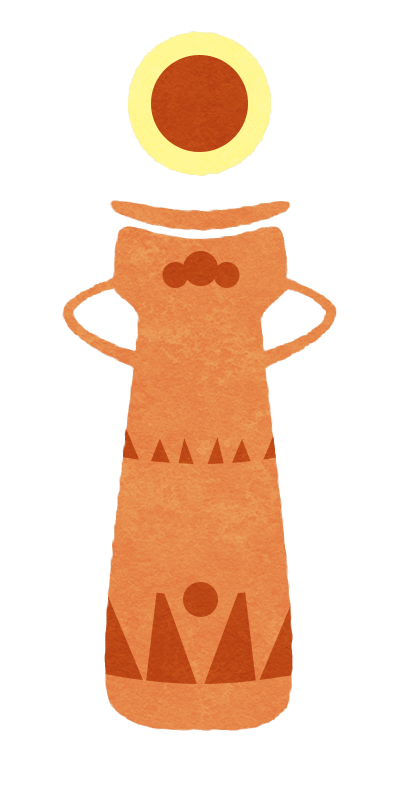The Kyteux are a devout heron-like people, who place great emphasis on their families— living or dead. They tirelessly seek to reclaim the land of their birth, which is currently owned by the nation of Zilopnou.
Though, as their legs are just long— not strong— they aren't quite fast. To combat this lack of speed— their necks are elongated, allowing them to see potential threats from farther away. Their shoulders are a little wider than that of an average human, with their arms extending midway down their thighs. Their beak-like noses protrude from their angular— almost androgynous— faces. They have average lifespan of 50 years and stand tall, commonly anywhere from 8'5"— 8'8".
Long ago, the Kyteux were driven from their homeland of the Cipou River delta by the Lliaqeu of Zilopnou. The river, to the Kyteux, is a holy site. The place of their birth. While establishing themselves and adapting to the land they were driven to, they continue to covet the land of Zilopnou. They believe them to be heathens— unworthy of living along the holy river's banks— and will stop at nothing to take it back.
Centuries of war, attacks, and sabotage have been waged against their enemies— with little luck. The Lliaqeu are well experienced warriors, and as such, the Kyteux must grow stronger to take back their homeland.
This raft is then floated into the center of the pool, and the child prodded with a long wooden stick until it cries— assuming it wasn't already doing so. It is believed that the souls of the dead can hear the cries of the newborn child only if it is placed within the center of a Euchyt, and they can only grant their blessings of wisdom, beauty, and strength upon a child if they hear its cries.
Certain religious dances will be performed by the family members closest to the departed, and when darkness begins to fall, the body will be pulled back to the edge of the Euchyt and loaded into a handcart. This cart is taken to an open air cremation site on the outskirts of town, while passing by locations important to the deceased. Often— assuming they are able— the departed's children will carry the cart.
Finally, the body will be placed atop a wooden pyre, and lit alight as the family who carried them there close their eyes and pray for their safe departure into the afterlife.
Family members in the army will often be placed into the same regiments, as it is believed that families can draw strength from one another.
Marriage ceremonies are large family affairs, with members of the two families attending. The wedded will perform a certain dance together, after which they are considered to be paired. While the majority of the Kyteux are monogamous, polygamy is accepted, and not entirely uncommon among them.
Willow trees, the Cipou River, Euchyts, and dance are often subjects found within Kyteux sculptures and reliefs.
Long, angled wooden overhangs extend from the top of one or two sides of most structures, giving shade from the heat over an area used for work, play, or relaxation. Long rectangular holes along the tops of walls allow for hot air to flow out, and can be stopped with blocks of packed hay and wood during colder weather.
Columns are common sights in most structures, often bordering doorways, lining outer walls, and supporting smaller upper floors. These are more often adobe than wooden, and are shape in unique forms specifically created for building columns. Bricks are often dyed or made from different minerals, and then placed to create mosaic patterns along the exterior and interior of a structure's walls.
Finally this bark is woven by loom, producing a rough pale brown fabric. The leaves can be crushed and boiled into a pale yellow green dye, which when combined with the pale brown textile produces a somewhat darkened pale yellow green color.
Most clothing will be either undyed, or simply colored with a single dye. Higher status individuals may die half of their clothing one color, and the other another. Most clothing is draped over one shoulder, and connected over the other with a button, strap, or buckle of some kind. Light sandals are often woven from willow branches, as well.
The Kyteux are a devout, faithful people— who believe that all they desire will be given to them from on high so long as they remain steadfast in their beliefs. Their religion, Zytex, places— much like their culture— great emphasis on the family. Even the departed are believed to hold power over the living, able to grant blessings or bestow curses from beyond to their offspring.
They do not believe in a god, and pray instead to their ancestors for aid, advice, and blessings.
Zytex does not follow religious texts, as most Kyteux cannot read. Instead, beliefs, stories, tenets, and scripture are passed on through dance.
Without reading, the audience can understand these dances. To aid the commoners in understanding lesser known choreographies, an elder or other experienced person may accompany the show with narration.
The Kyteux believe that they were born within the Cipou River delta, created from willow leaves by the first woman— Auroul. As the myth goes, Auroul was lonely— she had her family, sure, but wished for more— she wished to teach and raise others as she had learned much in her aeons of life.
She then plucked the leaves from a nearby willow and began braiding them into the form of the first Kyteux.
Wetland Adaptations
The Kyteux have adapted to living in the wetlands of the Cipou River— before they were driven out, hundreds of years ago. They are humanoid, with light brown skin and dark, green hair— allowing them to blend in with their surroundings, to an extent. Their long, thin legs allow them to wade through the wetlands and marshes around the delta with relative ease— letting them cool off from the searing sun beaming down on them.
The Scorned
Centuries of war, attacks, and sabotage have been waged against their enemies— with little luck. The Lliaqeu are well experienced warriors, and as such, the Kyteux must grow stronger to take back their homeland.
Traditions
Greetings & Farewells
When greeting strangers, Kyteux will nod their heads downwards for a short moment. For friends, they will flatten both hands and raise them spread in the air besides themselves at head's height. For family, this is mixed with an upwards nod. Finally, for nobility and those above themselves in status— they will lower their heads and bend their knees for a briefly held moment. Farewells are simpler, with a formal upwards nod. Casual, familiar farewells have the Kyteux lifting a hand and lightly tightening it into a fist.Milestones
Birth
Families are important to the Kyteux, and as such, all available family members are expected to be present during birth or soon after. Each family will have a pool they have a long history with called a Euchyt— either on their own property, or communal— to which newborn babies are taken, and placed on a small wooden raft softened with willow leaves called an eucheun.This raft is then floated into the center of the pool, and the child prodded with a long wooden stick until it cries— assuming it wasn't already doing so. It is believed that the souls of the dead can hear the cries of the newborn child only if it is placed within the center of a Euchyt, and they can only grant their blessings of wisdom, beauty, and strength upon a child if they hear its cries.
Coming of age
Upon reaching the age of thirteen, members of the child's family will get together for a ceremony called the Ytxoul— in which children are expected to memorize and perform one of many religious dances.Death
The dead must return to the same Euchyt they were born in, or it is believed their souls cannot pass on to the next life— and they will become terrible spectres known as Pinoul. All available family members attend the funeral, where the body of the dead is covered in willow leaves— and sometimes left with an item important to them— before being floated into the center of the pool on a large eucheun.Certain religious dances will be performed by the family members closest to the departed, and when darkness begins to fall, the body will be pulled back to the edge of the Euchyt and loaded into a handcart. This cart is taken to an open air cremation site on the outskirts of town, while passing by locations important to the deceased. Often— assuming they are able— the departed's children will carry the cart.
Finally, the body will be placed atop a wooden pyre, and lit alight as the family who carried them there close their eyes and pray for their safe departure into the afterlife.
Eating
When eating, one is expected to wait for the matriarch and patriarch of the table to take the first bite before eating, themselves. It is considered rude to leave the table to dispose of dishes before they do, as well.War
Despite their intense desire to reclaim their land, the Kyteux do not believe in surprise tactics— this is largely why they have yet to succeed. Such a cowardly move would only bring them to the same level of the heathens that stole the river from them. Patience and virtue will reward them in time. No, rather than do something so dishonorable, they will warn their enemies at least a day before attacking— sounding their great war horns from the distance, and setting up camp across from where they intend to attack.Family members in the army will often be placed into the same regiments, as it is believed that families can draw strength from one another.
Ideals, Love & Gender
Relationships
To be able to court someone, one must first become liked by their family. The individual will make their intentions clear over a family dinner, after which— if not immediately denied— they will attend dinner with the family for a period of up to three weeks so that they may judge their character and worthiness.Marriage ceremonies are large family affairs, with members of the two families attending. The wedded will perform a certain dance together, after which they are considered to be paired. While the majority of the Kyteux are monogamous, polygamy is accepted, and not entirely uncommon among them.
Beauty
Their green-tinted hair is often grown long, and braided in strips to resemble the flowing leaves of a willow tree. Kyteux do not grow facial hair.Gender
As a fairly androgynous people, the Kyteux do not have different expectations for men or women. Gender has little to no bearing on the lives of the Kyteux.Art, Architecture, and Dress
Art
The Kyteux are not painters, they believe much more strongly in the three-dimensional forms seen in sculpture, carving, architecture, and dance. These works are often religious in nature, and will depict important figures to their beliefs. One such figure that appears often is called Auroul, The Mother. She is depicted as a Kyteux woman, often knelt over, braiding the leaves of a willow tree into the form of a man.Willow trees, the Cipou River, Euchyts, and dance are often subjects found within Kyteux sculptures and reliefs.
Architecture
Much like the Zilopnou who ran them from their homeland, the Kyteux, too, utilize adobe throughout their architecture. Though, the largest different between the two is a larger incorporation of wood by the Kyteux. Buildings are often rectangular in shape, framed with wood throughout for support rather than a pure adobe brick structure. They do not plaster their structures, either.Long, angled wooden overhangs extend from the top of one or two sides of most structures, giving shade from the heat over an area used for work, play, or relaxation. Long rectangular holes along the tops of walls allow for hot air to flow out, and can be stopped with blocks of packed hay and wood during colder weather.
Columns are common sights in most structures, often bordering doorways, lining outer walls, and supporting smaller upper floors. These are more often adobe than wooden, and are shape in unique forms specifically created for building columns. Bricks are often dyed or made from different minerals, and then placed to create mosaic patterns along the exterior and interior of a structure's walls.
Dress
Kyteux dress is often lightweight, and loosely draped over their forms. Bark is stripped from willow trees, separated into smaller strips, and boiled for a time in a mix of water and wood ash. This softens the bark, so that it is more comfortable when worn.Finally this bark is woven by loom, producing a rough pale brown fabric. The leaves can be crushed and boiled into a pale yellow green dye, which when combined with the pale brown textile produces a somewhat darkened pale yellow green color.
Most clothing will be either undyed, or simply colored with a single dye. Higher status individuals may die half of their clothing one color, and the other another. Most clothing is draped over one shoulder, and connected over the other with a button, strap, or buckle of some kind. Light sandals are often woven from willow branches, as well.
Religion & Myth
The Kyteux are a devout, faithful people— who believe that all they desire will be given to them from on high so long as they remain steadfast in their beliefs. Their religion, Zytex, places— much like their culture— great emphasis on the family. Even the departed are believed to hold power over the living, able to grant blessings or bestow curses from beyond to their offspring.
They do not believe in a god, and pray instead to their ancestors for aid, advice, and blessings.
Zytex does not follow religious texts, as most Kyteux cannot read. Instead, beliefs, stories, tenets, and scripture are passed on through dance.
Without reading, the audience can understand these dances. To aid the commoners in understanding lesser known choreographies, an elder or other experienced person may accompany the show with narration.
Ancestral origins
It is believed that the Kyteux's ancestors have existed since time immemorial, and over many millennia, they built the world through blood, sweat, and tears.The Kyteux believe that they were born within the Cipou River delta, created from willow leaves by the first woman— Auroul. As the myth goes, Auroul was lonely— she had her family, sure, but wished for more— she wished to teach and raise others as she had learned much in her aeons of life.
She then plucked the leaves from a nearby willow and began braiding them into the form of the first Kyteux.
Kee-t-oo-sh
Related Organizations
Related Myths
Naming
Names are unisex, even when borrowed from Qetlec.It is worth noting that the Kyteux have their own dialect of Qetlec— which introduces the use of the "es" sound. Names unique to the Kyteux are Ceul, Seun, Ouns, Euns, Xeull, and Kleui
Taboos
Eye contact with unknown outsiders. It is believed that eye contact transfers and connects part of one's spirit, to do so with not only a stranger— but one of another race is unthinkable.Cursing your ancestors. One who curses the ones that brought them into existence will find themselves beset by terrible curses.
The holy tree
As the Kyteux believe themselves to have been weaved from willow branches, it is no surprise that the tree holds great significance within their culture.The clothes on their backs are oft woven from willow bark, the branches find their way into many Zytex ceremonies and rituals, and their art and architecture seek to pay homage where possible.
Like the willow, we Kyteux set root. We grow branches, outwards, and up into the heavens— we create families, which hang from these branches like leaves.
The one-day war
Upon one of many military campaigns to reclaim their holy Cipou River, the Kyteux finally gained an upper hand.This was before the days where the great red fort of Choxouli Noul blocked their advances— and a path to victory was within reach.
Before they could finish their, however— dire news came from their homes in the north. A terrible storm had wreaked havoc through Ponouli— homes were flooded, buildings has collapsed, and their families were in need of aid.
Would they stay and finally claim what they had so long desired? Or would they return, and save those which they valued most?
A general by the name of Ysoul made the call.
Should we forsake our families, the blessings from our ancestors would be lost— and victory would evade us yet again. They are testing us, and we must heed their call. We must return home immediately.And thus, after a mere day of fighting— the war had ended.








Comments
Author's Notes
Feedback is very much welcome! Whether on the content, or the formatting! Please, point out typos if you spot any!